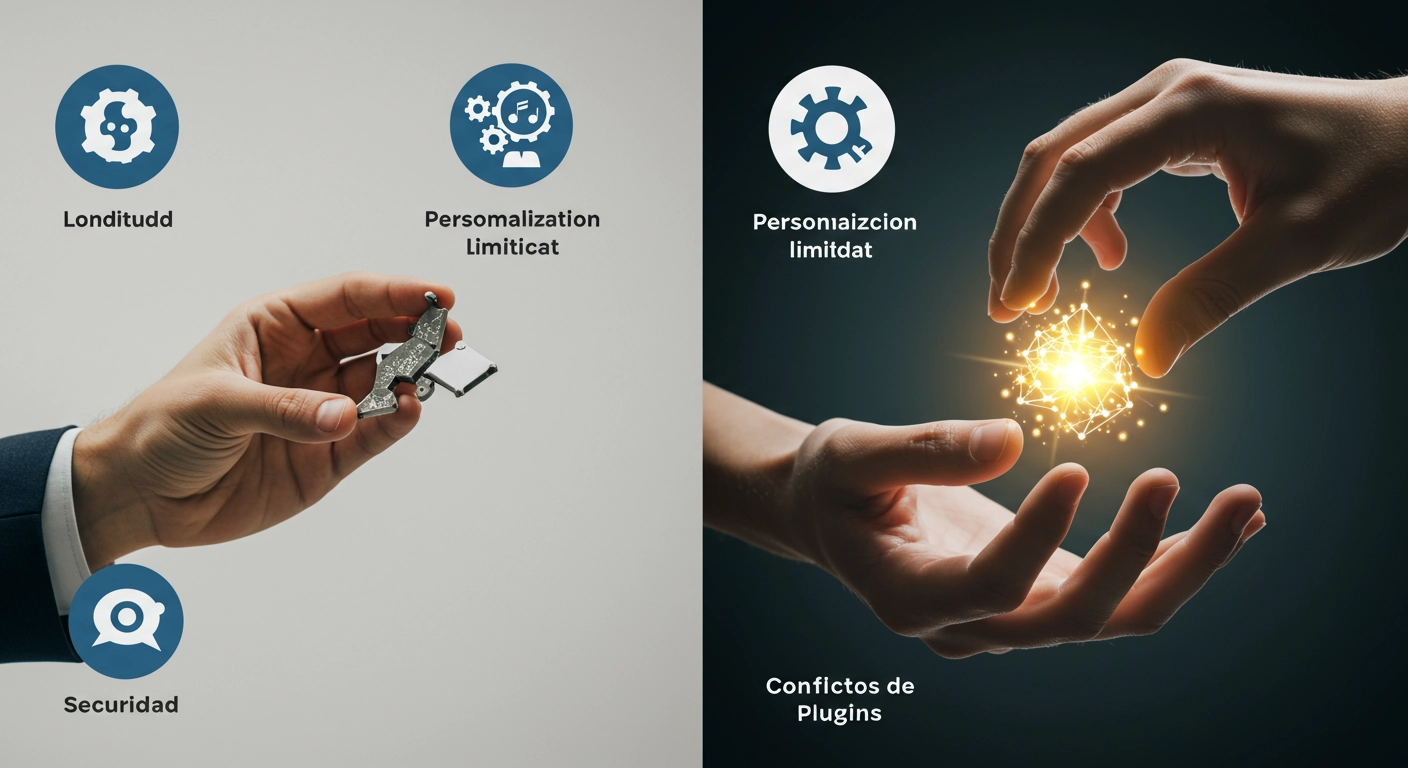5 Common WordPress Challenges & Key Custom Solutions

WordPress powers a large portion of the web, and for good reasons: it’s flexible, scalable, and has a huge community. However, like any popular platform, users often encounter certain recurring challenges. The good news is that many of these problems can be mitigated, or even eliminated entirely, by adopting a custom solutions approach instead of always relying on “one-size-fits-all” generic plugins.
Let’s explore five of these common challenges and how the ability to create specific functionalities can make a difference.
1. Website Slowness: The Silent Enemy
A slow site frustrates visitors and hurts your SEO.
- The Challenge: Over time, many WordPress sites accumulate plugins. Each one adds its own code, scripts, and styles. Some plugins are inherently heavy, offering dozens of features when you only need one. The result is a site that takes a long time to load, affecting user experience and your Google ranking.
- The Custom Solution: Imagine being able to implement only the exact functionality you need, without the extra code. Creating a lightweight micro-plugin for a specific task (like a simple cookie notice or a “back to top” button) instead of installing a heavy multi-function plugin can drastically reduce “bloatware.” Modern tools that allow for the efficient generation of these small pieces of code are key here.
2. Generic Functionalities That Don’t Fit 100%
Plugins that do “almost” what you need, but not quite.
- The Challenge: You find a plugin that seems perfect, but it’s missing that one small customization option, or it has a workflow that doesn’t quite fit your needs. Trying to modify complex plugins can be a nightmare or require programming knowledge.
- The Custom Solution: What if you could describe exactly how you want a feature to work and get it just like that? Platforms that allow you to define requirements in natural language to then generate the functionality can be incredibly powerful. This gives you granular control over every aspect, ensuring the solution adapts to you, not the other way around.
3. Security Vulnerabilities from Over-Reliance
More plugins mean more potential entry points for attackers.
- The Challenge: Every third-party plugin is a potential attack vector, especially if it’s not updated regularly or is poorly coded. The more plugins you have, the larger your site’s attack surface.
- The Custom Solution: By creating your own specific functionalities, you reduce reliance on third-party code. If these solutions are generated by tools that follow good coding practices and focus only on what’s necessary, you can have cleaner and potentially more secure code. Plus, by not depending on updates from multiple plugin developers, you have more control over maintenance.
4. Difficulty Implementing Unique Ideas Without Coding
You have a great idea for your site, but you don’t know how to implement it technically.
- The Challenge: You want a specific price calculator, a unique type of product filter, or a small interactive tool for your users, but you can’t find a plugin that does it, and hiring a developer is expensive or time-consuming.
- The Custom Solution: The rise of advanced no-code and low-code platforms, especially those incorporating artificial intelligence, is changing this. It’s now possible to describe a complex functionality and get a prototype or even a final solution without needing to be an expert in PHP or JavaScript. This opens up a world of possibilities for innovation on your own site.
5. Problematic Updates and Conflicts
The dreaded “I updated a plugin and something broke.”
- The Challenge: Updating WordPress, themes, and plugins is crucial for security, but sometimes an update can cause conflicts with other plugins or your theme, breaking functionalities or even the entire site.
- The Custom Solution: When you create specific, self-contained functionalities, they tend to be more stable and less prone to conflicts because they don’t try to interact in complex ways with dozens of other systems. If a custom-built solution is well-isolated and does only what it’s supposed to do, general WordPress ecosystem updates are usually less problematic for it.
The Power of Specificity
The trend is moving towards lighter, more specific solutions. Instead of looking for a “mega-plugin” that does everything, consider how small, custom-built functionalities can solve your WordPress challenges more efficiently, securely, and tailored to your exact needs. Exploring tools that facilitate the creation of these custom solutions can be a big step in optimizing your online presence.
Thinking about “custom solutions” is no longer just for large companies with unlimited development budgets. Modern tools are democratizing this capability, allowing more WordPress users to take full control of their sites.
Ready to take your WordPress to the next level?
Custom solutions and smart tools are transforming how we personalize the web. If you’re interested in exploring how you can create unique functionalities for your WordPress without hassle, discover what’s possible.
Explore Kairos WP